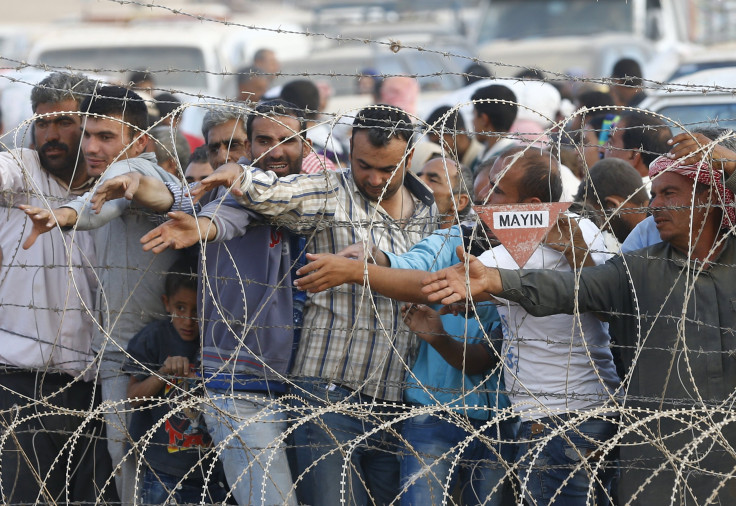ISIS News Update: Kurdish City On Syria-Turkey Border Kobane Might Fall To Islamic State

The Islamic State group was just 1.3 miles (two kilometers) away from invading the Syrian Kurdish town of Ayn al-Arab Wednesday, according to sources on the ground in Syria. If militants seize the city, known to Kurdish locals as Kobane, it would consolidate much of their territory in Syria and become their closest stronghold to the Turkish border. What’s more, it could snap an already frayed relationship between Kurds and the Turkish government. The Kurdish fighters defending Kobane, who experts said are “outnumbered and outgunned,” continued to resist the ISIS militants’ advances.
“They are defending their own land. They are politically motivated and consider ISIS invaders,” said Kurdish affairs analyst Mutlu Civiroglu. “In a way, the [Kurdish fighters] are protecting their own fathers, their own mothers and children.”
ISIS, the militant ground formerly known as the Islamic State of Iraq and Syria, wants Kobane for geographic, economic and logistical reasons, according to Civiroglu. If Kobane falls, ISIS would control 60 miles of land from their de facto headquarters in Raqqa to the Turkish border, which would provide new avenues to bring in foreign fighters and weapons. But the border would also be a revolving door, allowing wounded ISIS fighters access to better hospitals in Turkey and facilitating the sale of illegal oil, said Civiroglu.
However, even without its proximity to the Turkish border, Kobane would still be a significant territorial gain for ISIS. In the last month, Kurdish fighters from People's Protection Units (YPG) have resisted militant infiltration, unlike the surrounding 325 towns and villages now under ISIS occupation, according to the Syrian Observatory for Human Rights. Kobane is the logical next stop for militants.
“Kobane is an island,” said Civiroglu. Seizing the city would put militants in a better position to attack other Kurdish cities in Syria, he said.
Isolated #Kurds #Kobane are TINY yellow area (Ayn al-Arab) on north border surrounded by black #IS v @HaraldDoornbas pic.twitter.com/5ZeslOGy1k
— sandra (@LVview) October 1, 2014The YPG took control of Kobane in 2012 and declared it the center of Syrian Kurdistan this year. There are two other Kurdish cantons in Syria -- Jezira and Efrin -- and ISIS wants them both. Jezira shares part of its border with Iraq, where ISIS militants are fighting a different battle against Iraqi Kurdish peshmerga forces. It’s also home to several oil fields that, if seized, would give ISIS oil to sell or smuggle over the border. Efrin is located just miles from Aleppo, Syria’s largest city.
“They are acknowledging that ISIS has enormous power,” said Civiroglu. “They can enter the city, but they won’t be able to get control like they did in Raqqa. This city has been resisting a whole month.”
Having only recently established the cantons, Kurds are eager to defend their land. Many YPG fighters brought their families to safety at the border and then returned to the frontlines. At least 150,000 Kurdish refugees have fled to Turkey in the last week. Thousands of refugees remained in Turkey’s border town Suruc, where they were able to watch and sometimes even hear their compatriots defending their homeland from ISIS militants.
“People are very upset. They’re all related to people in Syria,” Civiroglu told International Business Times just minutes after speaking to sources in Kobane. “The situation is not good. Kurds are not going to let it go. The perception in Kobane is that Turkey has been backing ISIS,” said Civiroglu.
Critics have accused Turkey of helping militants. The Turkish government had “diplomatic and political negotiations” with ISIS to free 46 Turkish hostages, and according to critics, has long ignored that its border had become ISIS’s preferred method of entering or exiting Syria. A Turkish news channel showed live video feed from the Kobane border Wednesday, claiming that it showed ISIS fighters entering the city from Turkey. International Business Times could not independently verify the video.
Kurds are particularly skeptical of Turkey’s willingness to fight ISIS. Turkey’s Kurdistan Workers’ Party (PKK) and the YPG have separately accused the government of supplying weapons to the militants.
“Apart from the heavy weapons obtained in Iraq and Syria, armaments and munitions are being openly provided by Turkey to the [ISIS] gangs. We vehemently condemn this attitude of the Turkish state,” according to a statement from the Jazira Canton Government.
The Turks were at war with their own Kurdish opposition for years until a cease-fire in 2013. When ISIS threatened neighboring Kurdish populations in Iraq and Syria earlier this summer, the PKK urged a reluctant Turkey to take a stand against the militant group. The Turkish parliament will vote Thursday on a motion that would allow for the deployment of ground forces in Iraq and Syria.
If Turkey does not intervene in Kobane, “it will have a direct impact on the peace process [between Turkey and the PKK],” said Civiroglu. He added that the PKK would likely organize “protests, demonstrations” against the government and has already threatened that “there will be fighting.”
While Turkey waits on parliament’s vote, clashes continued Wednesday night in Kobane. Many Kurds are worried that their city would become the next Mount Sinjar, where ISIS massacred hundreds of Iraqi’s Yazidi minority and forced thousands of others to flee.
“It’s very likely they’re going to massacre whoever they find," said Civiroglu.
© Copyright IBTimes 2024. All rights reserved.






















